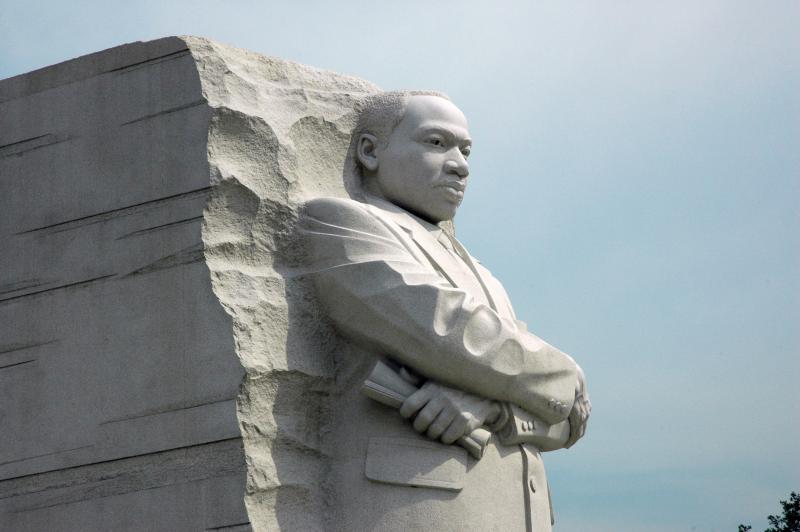 Each January, individuals and organizations across the nation pause to reflect on the life and legacy of Dr. Martin Luther King Jr., a man whose refusal to accept the status quo of his era led to many of the freedoms we enjoy today.
Each January, individuals and organizations across the nation pause to reflect on the life and legacy of Dr. Martin Luther King Jr., a man whose refusal to accept the status quo of his era led to many of the freedoms we enjoy today.
I attended a Martin Luther King Jr. observance Jan. 9 at the Department of Veterans Affairs Central Office (VACO) in Washington, D.C. Like many people, I have learned here and there about Dr. King, through a high school history class or a past observance I attended while in federal government or the military. I deeply respect his tenacity and courage.
Most of us can probably recite at least a few details about Dr. King and the civil rights movement, even if only from rote memorization. For me, this particular occasion at VACO took me far beyond being merely a spectator; it fueled a curiosity to jot down names of those who, until that day, were unknown to me, and to do more research and explore further, long after the speeches had ended.
Elisa Basnight, director of the VA Center for Women Veterans, spoke about how King’s legacy has personally influenced her –in the past, and now in her role at VA.
“As an African-American woman and a military Veteran,” Basnight said, “my accomplishments exemplify the manifestation of ‘the dream,’ for which no words can express my gratitude.”
Soon after, keynote speaker Royce Kinniebrew brought a large swath of history to life through a dynamic presentation – covering a period from the injustices during slavery and forward into civil rights.
He spoke about Dr. King’s unique commitment to a nonviolent mission and reminded us of other, lesser known individuals who fought for the same ideals. Sometimes their sacrifices – as in the case of civil rights activist Viola Liuzzo – came at the expense of their lives.
It was from Kinniebrew that I first heard about the “Triple Nickles,” African-American troops who, during World War II, parachuted into and battled dangerous West Coast forest fires set by Japanese incendiary balloons.
Through deftly wielded facts and the moving stories he told, Kinniebrew passionately urged us to remember that “Black history is not just for black people during the month of February, but for everyone who loves the truth all year long.”
Sitting in the audience and listening to the points made by Basnight and Kinniebrew, it was obvious how King’s actions continue to widely influence us all, throughout our nation, around the world and across decades of ongoing progress … with some of these same principles visible at VA and in that very room.
“Reflecting on Dr. King’s time and his contributions clearly reminds me of the important work and mission that we at the Department of Veterans Affairs have,” Basnight said, “in order to fulfill President Lincoln’s promise ‘… to care for him who shall have borne the battle and for his widow, and his orphan,’ by serving and honoring the men and women who are America’s Veterans.”
Basnight’s comments mirrored Kinniebrew’s in that the history of Dr. King and civil rights is for everyone to know.
“The civil rights movement is not limited to race; it encompasses all aspects of citizenship,” Basnight said. “Dr. King’s work was about equality for all. Although gender equality is still an ongoing movement, Dr. King’s achievements in promoting a cultural transformation in America most certainly had a beneficial impact on women’s campaign in gaining gender equality.”
Monday, Jan. 20, 2014, marks the official national recognition of Martin Luther King Jr. Day. This year, the celebration and its theme, “Remember, Celebrate, Act: A Day On, Not a Day Off,” has even greater significance as 2014 also marks the 60th anniversary of the end of segregation.
Decades later, King’s message perseveres.
“It has been almost 46 years since Dr. King was so cruelly taken from us,” Basnight said, “but his message of nonviolence – service to ensure equality for all – resonates more than ever today. Employees who attend our annual VA event, like me, are educated on Dr. King’s life and legacy, and the selfless service of countless others who sacrificed so much to hold our country accountable to its constitutional guarantees.”
Topics in this story
More Stories
Summer Sports Clinic is a rehabilitative and educational sporting event for eligible Veterans with a range of disabilities.
Report examines the input of over 7,000 women Veterans: They are happier with VA health care than ever before.
Veterans and caregivers, you can help shape the future eligibility requirements for the VA Caregiver Support program.






